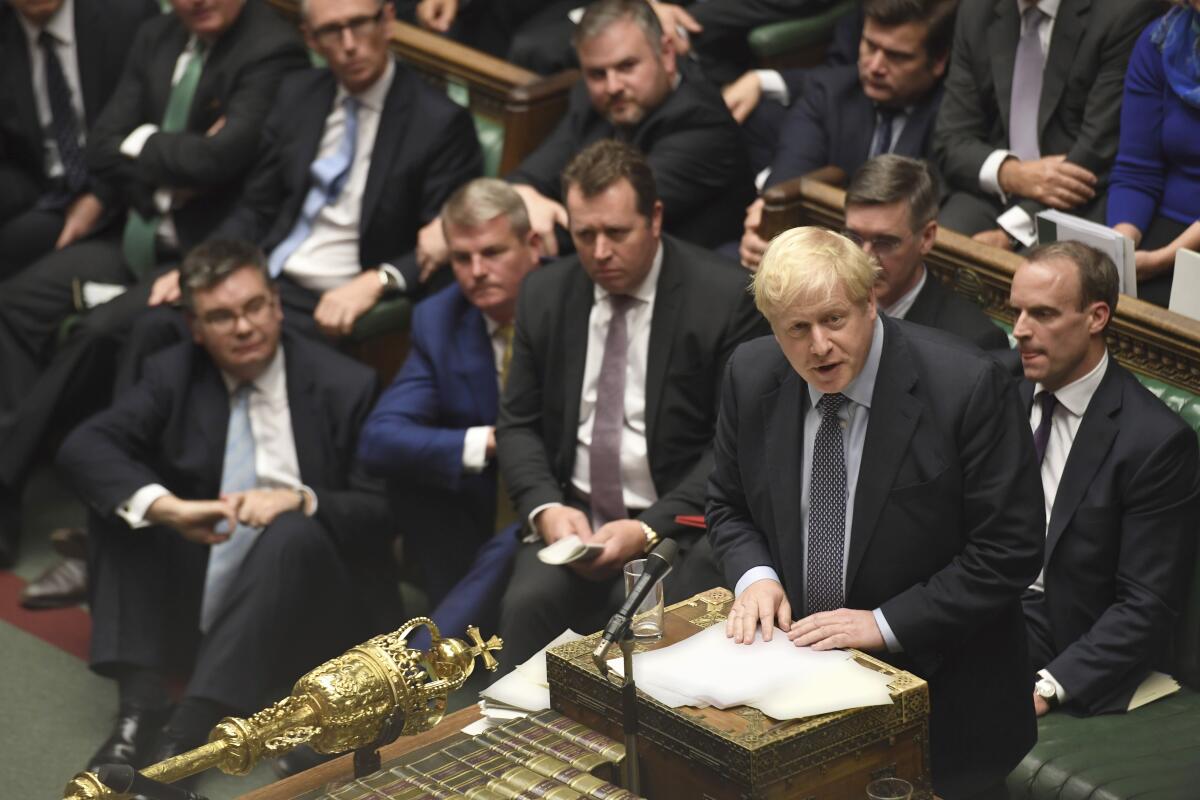Parliament to Prime Minister Boris Johnson: You can’t always get what you want

- Share via
London — British Prime Minister Boris Johnson said he would rather be “dead in a ditch” than get an extension of Brexit, Britain’s long-running, messy divorce from the European Union.
His worst fears came true Saturday with a House of Commons vote that obliged him to ask for a delay. His reluctance was palpable.
“I will not negotiate a delay with the EU and neither does the law compel me to to do so,” Johnson insisted. “Next week the government will introduce the legislation needed for us to leave the EU.”
But the request was reportedly sent, along with Johnson’s contention that an extension would “damage the interests of the UK and our EU partners.”
As Johnson was failing to get the decision he wanted, outside Parliament, hundreds of thousands of protesters demanded a different kind of vote, a new referendum dubbed a People’s Vote on Brexit. The masses cheered the news that the exit deal was still in limbo.
Britons who expected the complex minutia arising from the 2016 Brexit vote to be solved long, long ago have instead been taken on a roller-coaster ride that has converted once-soothing BBC newscasts into a cliffhanger reality show and highlighted deep divisions the United Kingdom still must overcome.
Johnson, a colorful, incendiary former mayor of London, has cast himself combatively, as the Incredible Hulk, ready to break EU shackles, engaging even the most mild-mannered EU technocrats in public drama.
“From Incredible Hulk to Incredible Sulk,” tweeted Guy Verhofstadt, the chief Brexit representative for the European Parliament, after Johnson pulled a no-show at a Brexit news conference in Luxembourg in September, leaving that nation’s Prime Minister Xavier Bettel standing alone at the podium on live television. Nigel Farage, Brexit Party leader, later derided Bettel as a “pip-squeak.”
“Don’t put the blame on us because they don’t know how to get out of the situation they put themselves in,” Bettel countered.
The sophomoric schoolboy banter is all too familiar to Brits, who know that the bellowing call to “Order!” at British Parliament promises things will be anything but orderly on Brexit. Like a recent Brexit debate in which Johnson called Labor Party opposition leader Jeremy Corbyn a “big girl’s blouse.” Or the Tory wordplay that linked passing an exit deal with manhood among the Brexiteers one columnist dubbed the “macho drama queens of Brexit.”
Such as: Steve Baker, chairman of the Brexit European Research Group and self-described “Brexit hardman.” And Conservative Party politician Geoffrey Cox, a fellow Eurosceptic parliamentarian, who promised “Cox’s codpiece” — a solution to avoiding a full-on border between the UK’s Northern Ireland and the EU’s Irish Republic.
For his part, Johnson vowed to put “the lead in the collective pencil” to move Brexit forward.
This sort of talk combined with the perpetual threat of a no-deal Brexit makes the members of Cool Britannia lose their cool, feeling like their country’s storied Churchillian discourse has been reworked by writers for Monty Python or “Absolutely Fabulous.”
On Saturday at least, Johnson adopted a tone of politesse in his appeal for a yes vote on the Brexit deal he had finalized with the EU Thursday. But deep opposition emerged along familiar lines.
Northern Ireland parliamentarians felt the plan to avoid a potentially conflicted land border by maintaining some EU customs structures pushed it away from the UK, but Scottish parliamentarians thought it placed Scotland, which would be outside of those structures, at a competitive disadvantage.
“People up and down Scotland” — where the 2016 vote went against Brexit — “know that the Prime Minister, his Brexit fanboys and the Vote Leave campaign have ignored and shafted Scotland,” Scottish parliamentarian Ian Blackford said.
Other British lawmakers said they were being asked to rubber-stamp something they hardly had time to read, and were concerned how it would affect their constituents.
Brexit has already cost Britain $89 billion since the 2016 vote, according to one think tank. Another estimate of the cost once the divorce is final: $168 billion over the next 15 years. UK companies that trade with Europe are already being hit.
Meanwhile, small-town Britons, who voted heavily for Brexit, are feeling the pain of austerity and unemployment, and parliamentarians don’t want to worsen their lot. British retirees in EU countries rely on reciprocal healtcare agreements, and lawmakers want to make sure they’re secure.
Donald Tusk, president of the European Council, tweeted on Saturday night. “The extension request has just arrived. I will now start consulting EU leaders on how to react.” Johnson had also sent a letter saying he thinks he can get his vote before the Oct. 31 deadline.
Analysts have jokingly wondered how the British Empire ever held itself together. When the British upper classes wreaked havoc before, it was on India or Ireland.
“I’ve ended up calling my cat Brexit,” Nathalie Loiseau, then the French minister for European Affairs, wrote on her Facebook page earlier this year. “It wakes me up meowing like crazy every morning because it wants to go out, but as soon as I open the door, it just sits there undecided and then looks angry when I put it outside.”
Loiseau didn’t actually have a cat. And the United Kingdom still doesn’t have a Brexit.
Anne-Marie O’Connor is a London-based journalist and the author of “The Lady in Gold, the Extraordinary Tale of Gustav Klimt’s Masterpiece, Portrait of Adele Bloch-Bauer.”
More to Read
A cure for the common opinion
Get thought-provoking perspectives with our weekly newsletter.
You may occasionally receive promotional content from the Los Angeles Times.









